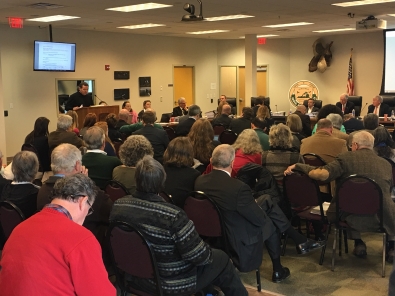Dominion pipeline proposal undermines Virginia’s conservation easements
The latest route Dominion is pursuing for its Atlantic Coast Pipeline would directly conflict with the terms of open-space easements the Virginia Outdoors Foundation (VOF) holds on several conservation properties across the central Appalachians.
It was standing room only at a public meeting last week as the VOF Board of Trustees considered Dominion’s ten requests to “convert” the protected lands to pipeline right-of-way. The board heard from dozens of landowners, farmers, representatives of land conservation organizations, and local government officials who oppose the conversions and urged VOF’s Trustees to stand strong against Dominion.

Many landowners and easement donors who urged VOF to deny the conversions acknowledged that VOF does not have the power to stop the pipeline, or even the final say on whether the pipeline can be routed through the protected properties; that authority ultimately rests with the Federal Energy Regulatory Commission (FERC). However, they made clear they expect VOF’s trustees to deny Dominion’s request, both because a denial would uphold the stewardship commitments that VOF makes to landowners when it accepts easements, and because it would send a clear message to FERC that the pipeline should not cross conservation land.
Steve Van Lear’s family has owned land in Bath County for nearly 100 years, and VOF holds an easement on their land. He attended the meeting to urge the trustees not to hide behind FERC, but rather to “stand in front” of the agency:
“You need to show opposition to FERC. You need to join the people of this Commonwealth against something that should not happen. Show integrity for your mission statement.”
VOF has an impressive track record of defending the easements entrusted to its care. However, Dominion is testing that record with a request that, if approved, would convert more total acreage out of protected status than VOF has approved in all prior conversion requests over its 50-year history.
For now, the trustees want more time. Citing the tremendous amount of public feedback and information they have received on the issue—including letters from more than 200 people urging them to uphold the easement protections—the VOF Board of Trustees ultimately voted to defer a decision so they could consider all the input.
Looking ahead, the Virginia statute that lays out the limited circumstances in which conversions are allowed offers a clear resolution of the issue. “If you, the trustees, cannot reasonably make all the findings that the law requires, you simply do not have the legal authority to approve the conversions,” said Southern Environmental Law Center Senior Attorney Morgan Butler. “And that is clearly the case here.”
